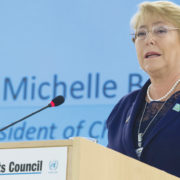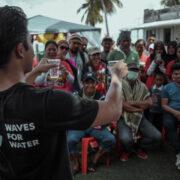THE number of deaths associated with the Philippine government’s anti-drug campaign continue to be a concern for the United Nations’ human rights body, its chief revealed at the Human Rights Council on Monday, June 24.
United Nations High Commissioner for Human Rights Michelle Bachelet, in her opening statement at the 41st session of the Human Rights Council, expressed concern over the “extraordinarily high number of deaths” and “persistent reports of extrajudicial killings” since Philippine President Rodrigo Duterte took office on June 30, 2016.
The Philippine National Police (PNP) recently revealed that 6,600 “drug personalities” have been killed in law enforcement operations since Duterte assumed his post until May 31, 2019. However, human rights watchdogs estimate more than 27,000 deaths have occurred since June 2016.
It also announced that 240,565 drug personalities were arrested in 153,276 police operations nationwide with 1,283,409 surrendering in the same period.
“Even the officially confirmed number of 5,425 deaths would be a matter of most serious concern for any country,” Bachelet said.
The Philippine government, for its part, reiterated that extrajudicial killings are not state policy and that law enforcement operations are done according to due process. It also said it recognizes and upholds human rights; allegations of abuse are merely attempts at smearing the reputation of the Duterte administration.
Taking action
UN special rapporteurs have called for the UN Human Rights Council to launch an independent probe into the deterioration of human rights in the Philippines as well as take action on the alleged attacks on human rights defenders and independent watchdog institutions.
Bachelet, who welcomed the special rapporteurs’ call for a probe, said: “There should also be comprehensive and transparent information from the authorities on the circumstances around the deaths and investigations related to allegations of violations. These could dispel any false allegations and help regain trust for the authorities.”
However, the Philippines said the call was made “in bad faith by parties who want to undermine domestic processes and spread disinformation, on the basis of one-sided reports coming from questionable sources.”
According to the Palace, the special rapporteurs were “foreign propagandists masquerading as human rights protectors.”
In response, Presidential spokesperson Salvador Panelo this week said that one or two of them have “tried this [tack] using some gullible if not biased local and foreign media sowing the seeds of negative force and perpetuating them.”
“They used the art of continuing miscommunication to clothe them with believability,” he added.
‘Not too late’
Bachelet noted how human rights defenders, journalists, lawyers, priests and others who have spoken out against the administration’s policies have been threatened by government officials.
“This creates a very real risk of violence against them, and undermines rule of law, as well as the right to freedom of expression,” she said.
But according to the Human Rights Watch, it is not yet too late for the UN member states to prevent killings in the Philippines.
“UN member states stood by while thousands were killed, but it’s not too late for them to act to prevent the killing of thousands more,” said Laila Matar, HRW deputy director for the UN, in a statement on Monday.
“When the council convenes in Geneva today, they have an opportunity to do just that—by urgently establishing an international investigation,” she added.





